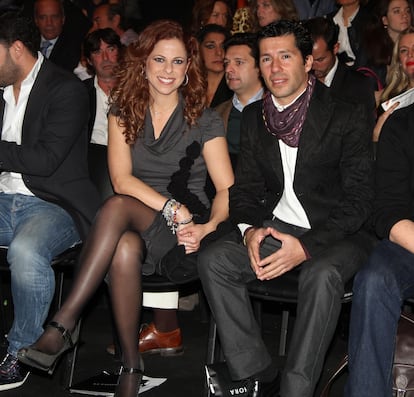“In the mirror, through the tears, I could only see my face smudging by two large black grooves. I couldn’t stop crying. A great pain gripped my chest. He wanted to make Pastora Soler disappear. Erase with the stroke of a pen the artist that took me 20 years to build. Going back to being Pili Sánchez, the happy girl who dreamed of being a singer at home.” So it begins When the lights go out, the stars appear (HarperCollins), the artist’s biography published on November 5th, which will be presented to the press on the 11th and in which he reflects on the need for self, on fears and on the need to be reborn.
Pastora Soler is much more than a singer: when the lights go out she is Pili Sánchez (Coria del Río, 47 years old), daughter, wife and mother. And now he wanted to enclose his story, his memories, his failures and his successes in the pages of the book. Nothing would be understood about his life without each of the chapters he now tells: from his discovery as an artist to the stage fright that forced him to stop and move away from the scene in 2014 to return two years later, but at his own pace.
“This episode marked a before and after in my career, and I don’t want my daughters, who are still very young, to see it. I want to be the one to really explain to them the hardship that their mother suffered, and share with them the learning process that began that night”, he explains, recounting what happened on March 8, 2014 in Seville, when he fainted on stage during a concert. An event that will mark his history: videos of that moment flooded social media and he even asked in his contracts, some time later, that those images not be shown during interviews. Even though she tried hard to be the same again, she failed. Eight months later, in November of that year, she lost her voice during a concert in Malaga: “I had become mute, but my mind did not want to be silent and I decided to leave the stage”, she says in the book. “I went under a very thin table. I curled up into a ball and closed my eyes. If I had found a smaller hole, that’s where I would have hidden. What I wanted to do at that moment was disappear. I wanted to die to put an end to that suffering. I no longer had the strength to even cry.” The next day, he will publish a statement on his social networks announcing his retirement from music “until he regains his confidence”.
But before we get to this point in the story, we must go back nearly four decades to understand its beginnings and how a very young Pili Sánchez became known as Pastora Soler. In 1994 the opportunity of a lifetime would arrive. Luis Sanz, discoverer of artists such as Rocío Dúrcal and representative of Lola Flores and Rocío Jurado, participated in one of her auditions and became her manager. First of all the name had to be changed to something more artistic. Thus a new singer was born.
For the first time, Pastora Soler recounts some of the episodes she experienced with the representative and which until now were unknown: “Luis Sanz, God bless him, was a complicated person. Out of respect and in gratitude for everything he did for me, I will limit myself to talking about what his presence meant for my life (…) His dominating influence, trying to control all aspects of my life, from my image to my artistic decisions or what I could do in my daily life, family.” He goes on to explain: “He wanted to control my whole life and my parents, with the best intentions, let him. Sanz managed to call me at home at three in the morning because he had an idea.”
His constant control will not cease and will also affect him personally: “It didn’t make me forget the insecurity caused by the fact that he always questioned me. The person who manages your career should support you, help you grow… Well, none of that. He always highlighted what had gone wrong or not well (…) I constantly sought his approval, and I accepted and assumed the high degree of discipline he imposed on me, even if sometimes it crossed the line.”
That control also changed his summers: since he turned 16 and for three consecutive years he had to go and live for a few days at his representative’s house in Marbella. “I was amazed by what he did with me. He was never satisfied and stressed the issue of weight. He always saw me as fat, he put me on a diet and I started taking care of myself and exercising. I wanted to become the little doll he had in his head. Thank God, the situation did not cause me any eating disorder,” he explains in the biography. Even though his contract expired when he was 25, he continued to be very attentive: “He called me and said: ‘I saw you on that program and you’re really fat’. I know I’m not a beauty. But I don’t have as many flaws as the ones Sanz found in me. Besides the weight problem, he was jealous of my nose: ‘It’s very ugly’. He said I had to have it done. I refused to undergo surgery to correct it.” He also advised her to have breast surgery, which she agreed to: “I was a little self-conscious about the lack of breasts.”
The representative died in 2012, but Pastora Soler assures that he is still present in her life: “His obsession, which I made mine, was that she was perfect. All this affected my self-esteem and generated a lot of insecurity in me. It put me to the test, I understood this over time.” He remembers having also lost a song that Alejandro Sanz had composed because of the decisions he had made and which he had not shared: “He insulted me and started yelling at me that I had betrayed him, that I was unhappy.” One morning, some time later, he heard that song on the radio, sung by another artist whose name he did not reveal. “He closed more doors for me than he opened. I had people telling me it was impossible to do business with him,” he explains.
She also told him who her boyfriend should be: “He thought the most suitable one was Morante from La Puebla. He is a friend because we are from the same city as me and he is the same age as me. I remember that one summer night all my friends and Morante’s friends met on the beach. The next morning I told Luis, because I had to give him the account of everything I had done.” “It was the perfect excuse to call a couple of his journalist friends and give them the information. From that night of laughter was born the hoax that haunted me for years as if we had something. And that never happened,” he denies in his book three decades later. One day he received a phone call: he was no longer his representative because he was retiring. However, he had already signed who would be his successor, without letting the artist have any say in the matter.

At the beginning of the century she will meet the man who years later will become her husband and father of her two daughters. Francis Viñolo was a dancer and choreographer of his concerts and, although the first thing that was born was friendship, this soon became something more intense. “He knew me in all my facets. He knew Pili and Pastora Soler. We went out to celebrate, we had endless conversations on the phone. We were friends. In addition to his confidant, I was his advisor”, he recalls in the biography. She left her boyfriend and began a relationship with Francis, after he asked her father for her hand.
Pastora Soler assures that the beginning of her fall came after her participation in Eurovision 2013, where she came in tenth place. “The night my voice, my body and my soul shouted to me ‘we’ve come this far,’ if I had found anything useful under that table where I hid to do it, I would have taken my own life. I had been suffering for months and couldn’t take it anymore. My life was a nightmare,” he explains in a chapter titled “Goodbye to Pastora Soler.” “I left to recover Pili, the girl full of dreams, and Pilar, the woman who wanted to take back control of her life and be happy again,” he says.
A few weeks after announcing her retirement in 2014, she discovered she was pregnant with her first daughter: “She was my salvation. Pastora Soler had passed away and my only priority at that time was to take care of myself, heal and prepare to be a mother.” Little by little, she began to understand what the problem was and how to deal with it to continue with her life: “In reality, my problem had not been professional. What had failed was my personal life. I had taken very little care of Pili, of Pilar. I had been very neglected because, since I was little, others had taken control. And it was time for me to do it. I had to focus on myself and be master and owner of my decisions, and so it was. I was doing.”

In 2016, he announced to his record label that it was time to return, but that he would do so at his own pace. “I do not deny, and I never will, the scars I carry in my soul. Only those who fought and survived have wounds, and mine had already healed. I had resisted the life I led, which made me suffer so much,” he says. He gradually returned to the stage and public life, but he still had one last shot left. In August 2020, months after welcoming his second daughter, his father passed away after a long illness.
After many years of learning, the interpreter of The bad habit He learned to set limits for himself: “Don’t stay away from home for more than a week, don’t do more than two concerts in a row, don’t do things out of commitment that I know, a priori, They will require a lot of effort and I won’t enjoy them.” But despite the mental health problems that have plagued her throughout her career, she finally managed to manage the latest ailment she suffered from. Last March, a doctor diagnosed her with a peritonsillar abscess (a buildup of infected material around the tonsils) and informed her that she needed to treat it urgently. The artist, with an agenda already closed for the next few days, wanted to delay the surgery. “Fortunately, I had that moment. of clarity to identify the ghosts of the past and face them face to face. “My body was warning me and I didn’t seem to want to listen to it.”



